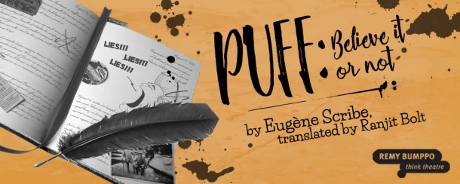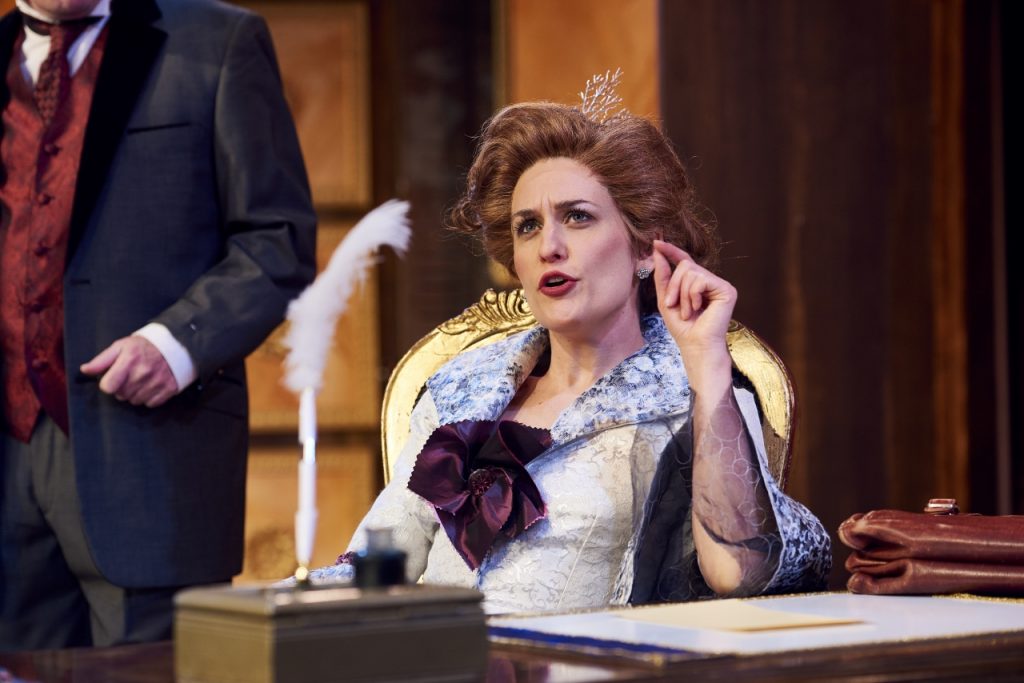THE FICTIONS THAT MAKE FACTS
This two-act comedy relishes a cruel contradiction: false facts. Rich with rancid exposés, its 150 minutes indict press-agent “puffery,” strategic lies that trigger self-fulfilling fates, colonialist xenophobia, and “collusions in deception” that are perversely preferable to proof.
It all sounds ferociously familiar.
But it’s not the gasbag bombast of a Trump-ed 2017 United States. It’s high (and low) society in 1848 Paris, the sprightly setting for Eugène Scribe’s acerbically topical Puff: Believe It or Not. Thanks to Ranjit Bolt’s sassy translation, this prolific playwright/librettist delivers ’” 169 years late and right on schedule ’” a time bomb. Its past is our palpable present. Snobbery, ambition, affectation, spite, jealousy, nepotism, bribery and blackmail, and, in complete contrast, embattled decency ’” these constants vary only in scope, style, décor and camouflage. Puff is cursed to never be dated.
It’s a cunning combination ’” Scribe’s world-weary cynicism, Bolt’s presentational playfulness, and director Nick Sandys’ supple world-premiere staging, a Remy Bumppo Theatre Company debut at Chicago’s Greenhouse Theater Center. Scribe’s Louis-Philippe drawing rooms hardly differ from Washington echo chambers: Here deniable truths and unverifiable falsehoods diabolically combine as puff, “lying carried to the level of speculation.” Scribe spares no section of society ’” business, literature, government, the army. “Truth is outlawed” and “puff is king.”
As implacably satirical as Balzac’s best, Scribe plotted plays the way generals marshal troops. Lies, of course, are essential to create conflict: More so than most plays, with Puff, method and material conspire, though, unlike the characters, the audience is always in the know.
That means recognizing from the start the isolating integrity of former cavalry officer Albert d’Angremont (dashing Joshua Moaney). A chronically honest veteran of France’s occupation of Algeria, our intrepid Legionnaire has returned to Paris in a high-minded attempt to increase the pension of his beloved general’s impecunious widow.
A part-time poet and full-time romantic, Albert finds himself in a gilded cage of polished surfaces. Undeterred by backstabbing bureaucrats, his one driving mission is his passion for Antonia de la Roche-Bernard (demure Netta Walker), the girl he left behind. But Antonia’s profile has been updated since Albert’s initial adoration: She’s become a pawn in the financial schemes of her stockbroker brother Maxence (a venal Gregory Geffrard), a charlatan who hopes to make up in stock swindles what he’s lost to gambling.
 With help from casually corrupt publisher Napoléon Bouvard (an efficiently evil Peter A. Davis), Maxence has entangled his sweet sister in an engagement de convenance with a rich dupe, the Comte de Marignant (Christopher Sheard), a state councilor with considerable clout. This poetaster’s obsession is to join the Académie française, and his latest vanity-book about the war in north Africa may do just that.
With help from casually corrupt publisher Napoléon Bouvard (an efficiently evil Peter A. Davis), Maxence has entangled his sweet sister in an engagement de convenance with a rich dupe, the Comte de Marignant (Christopher Sheard), a state councilor with considerable clout. This poetaster’s obsession is to join the Académie française, and his latest vanity-book about the war in north Africa may do just that.
The self-promoting count in turn is pursued by Corrine Desgaudets (Kelsey Brennan, practically channeling Patti LuPone), a temperamental, blue-stocking salonista and self-proclaimed “Tenth Muse.” As the daughter of the debutante’s guardian, Corrine ’” a Dumas-like demimondaine ’” is a convenient confidante to Antonia, a closeness that invites conspiracy. Completing Scribe’s rogues’ gallery is the fashionably pessimistic pauper-nobleman César Desgaudets (David Darlow), a cheapskate whose still-gilded title is a ticket to soirées and stock options. Power-pointing Scribe’s messages, César all but invents the art of the deal.
As sharp-etched as Dickens’ quirkiest creations or Wilde’s poseurs, Scribe’s sextet fuels the action with their follies. It’s madness to attempt a synopsis for a “well-made” play where secrets are sacred and “capitalist thieves” a dime a dozen. Like Molière’s misanthropic Alceste, Albert’s bracing refusal to play the hypocrite, especially in his quest for Antonia, both stands out and gives way: Sadly, in Scribe’s world, the final obscenity is how a profitable lie beats an inconvenient truth any night. Why should morality not be up for sale when everything else is?
Sandys’ skilled cast, including well-crafted cameos by Jerry Bloom and Matt Browning, misses no opportunity to twist Scribe’s knives. Darlow’s dry delivery, as always, nails the author’s polemics like Luther’s theses on the church door. Moaney’s effortless uprightness contrasts mightily with Scribe’s paradoxical, prevaricating Parisians ’” except for Walker’s tender-hearted ingenue Antonia. Remy Bumppo’s caricatures deserve each other ’” and, alas, their audiences have earned them too. If drama delivers the lies that tell the truth, Puff could well be the perfect play.
Pumping out the play’s parallels are frequent but forgivable anachronisms ’” modern mannerisms, Joe Schermoly’s slyly revisionist parlors, and a contemporary musical backdrop. These abound and sometimes distract. But they’re all in the service of a very welcome theatrical rediscovery, a French classic to make yesterday tomorrow.
Puff: Believe It or Not
Remy Bumppo Theatre Company
Greenhouse Theater Center, 2257 N. Lincoln Ave.
ends on December 31, 2017
for tickets, call 773.404.7336
or visit Remy Bumppo
for more shows, visit Theatre in Chicago










